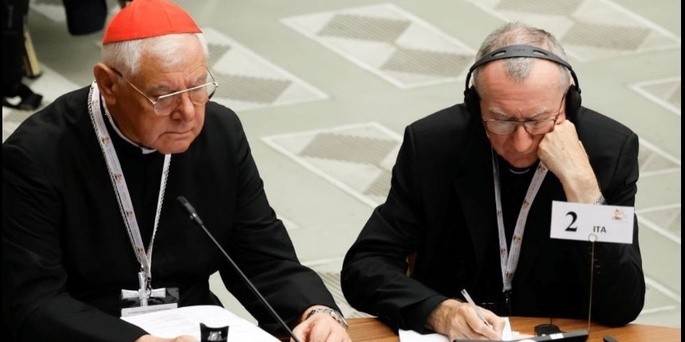 |
Loginoder neu registrieren? |
|||||
              
| ||||||
SucheSuchen Sie im kath.net Archiv in über 70000 Artikeln:     Top-15meist-diskutiert
|  The mystery of our faith: Why the birth of Jesus is the foundation of Christianity31. Dezember 2024 in English, 1 Lesermeinung Gerhard Cardinal Müller: The incarnation of God is not just a one-time event, but remains the foundation of our faith. Without it, Christianity would be meaningless. Rome (kath.net) The Christmas story is not just an old tradition or a touching story that accompanies us during Advent. It is the testimony of a unique event in the history of humanity: God became man. The birth of Jesus from the Virgin Mary does not simply proclaim a religious message, but reveals a deep, real truth: "Today in the city of David a Savior has been born to you; he is the Christ, the Lord" (Luke 2:11). Gerhard Cardinal Müller explains this in his exclusive article about Christmas on kath.net. The Prefect Emeritus of the Congregation for the Doctrine of the Faith emphasizes that Jesus Christ is not simply a founder of religion or a teacher, as there were many before and after him. He is the "Savior of the world" (John 4:42) - not only through his message, but through his entire life, death and resurrection. He is the only mediator between God and man (1 Tim 2:5), because as God and man he has bridged the gap between heaven and earth. Why the central message is often suppressed In our modern world, many Christians, especially theologians and priests, are reluctant to clearly confess that Jesus Christ is truly God and man. Instead, they try to present faith in a way that is compatible with today's way of thinking. They speak of Jesus as a "symbolic figure" or as part of a "meaningful narrative" that provides comfort and guidance without insisting on the truth of the events. But the question remains: Are we dealing with a real intervention by God in history, or is faith just a human construct, a wishful thinking that gives hope but has no connection to reality? Many "modern" approaches try to reduce the Christmas message to a feeling or a philosophy of life. The problem is that faith loses its foundation when it is no longer tied to the real incarnation of God. The incarnation of God as the core of Christianity The central promise of Christianity is that God himself became man in order to be close to us and to redeem us. This incarnation is not just a beautiful image or idea, but an actual event. God revealed himself through Jesus in our world - with all its limitations, pain and challenges. However, this message contradicts many worldviews, both in ancient times and today. Even then, philosophers such as Celsus or the Emperor Julian the Apostate considered the idea that God could connect with the material world absurd. They saw God as something pure, spiritual that should have nothing to do with the imperfection of the world. This way of thinking still exists today: some see Jesus only as a moral role model or symbolic figure, but not as the true son of God. The Christian faith strongly contradicts such views. It emphasizes that the world as God created it is good and that the material world is no obstacle to God's closeness. On the contrary: God loved the world and man so much that he himself became a part of it in order to redeem us from within. Why faith becomes empty without the incarnation If the incarnation of God is seen only as a symbol or myth, faith loses its power and meaning. Christianity is then reduced to a human system that provides moral rules or pursues social goals, but has no real connection to God. But faith lives from the fact that it is based on a real revelation from God. Many modern Christians try to "save" Christianity through such interpretations by adapting it to the way of thinking of today. They present the core Christian statements - such as the Trinity, the forgiveness of sins, the bodily resurrection of Jesus - as outdated ideas that could be replaced by universal moral principles. But this is precisely what takes away faith's deep meaning. The Christian faith is not a mere philosophy or guide to life. It is the encounter with the living God who has come close to us in Jesus Christ. This truth is non-negotiable and is the essence of Christianity. The meaning of the Incarnation for our lives Through the Incarnation, God showed us that he has not given up on the world and on us humans. He is not a distant, unapproachable God, but a God who shares our lives, knows our worries and is close to us in everything. The birth of Jesus means that God loves us and that he has opened up a way for us to return to him. This message is just as important today as it was then. It reminds us that we are not alone and that there is more than the visible world. God calls us to trust him and to orient our lives towards him. The lasting foundation of faith The incarnation of God is not just a one-time event, but remains the foundation of our faith. Without it, Christianity would be meaningless. Through Jesus, God has not only given us hope, but also the opportunity to become his children (John 1:12). Cardinal Müller concludes with an appeal: We must not forget that faith in Jesus Christ is the source of our life. He is the true God who redeemed us and the one who will continue to give us hope and support in the future. "For we know that the Son of God has come and has given us understanding so that we may know the true God. And we are in the truth, in his Son Jesus Christ. He is the true God and eternal life" (1 John 5:20). The Christmas message is not fiction, but the heart of the Christian faith. It reminds us that God has revealed his love to us in Jesus - a love that remains and sustains us, yesterday, today and forever. Archive photo: Cardinal Müller at the Vatican Bishops' Conference 2024
Ihnen hat der Artikel gefallen? Bitte helfen Sie kath.net und spenden Sie jetzt via Überweisung oder Kreditkarte/Paypal!  LesermeinungenUm selbst Kommentare verfassen zu können müssen Sie sich bitte einloggen. Für die Kommentiermöglichkeit von kath.net-Artikeln müssen Sie sich bei kathLogin registrieren. Die Kommentare werden von Moderatoren stichprobenartig überprüft und freigeschaltet. Ein Anrecht auf Freischaltung besteht nicht. Ein Kommentar ist auf 1000 Zeichen beschränkt. Die Kommentare geben nicht notwendigerweise die Meinung der Redaktion wieder. |  Mehr zuMüller
Glaube
Kardinäle
|       Top-15meist-gelesen
| |||
 | ||||||
© 2026 kath.net | Impressum | Datenschutz | ||||||
